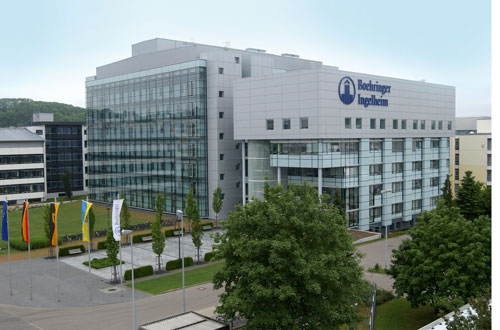
Boehringer Ingelheim already has one blockbuster drug for fibrotic lung disease in Ofev, but has just signed an alliance with South Korea’s Bridge Biotherapeutics to try to extend the franchise.
The deal centres on BBT-877, an autotaxin inhibitor that is in phase 1 testing for fibrosing interstitial lung diseases, including idiopathic pulmonary fibrosis (IPF), a life-threatening lung disease that is the approved indication for Ofev (nintedanib) and affects around 3m people worldwide.
Bridge stands to receive up to €1.1bn ($1.24bn) under the terms of the deal, including €45m in upfront and near-term payments. The partners intend to advance BBT-877 into a phase 2 trial later this year.
Autotaxin – also known as NPP2 or ENPP2 – is a secreted enzyme that is involved in a molecular pathway that leads to the formation of inflammatory and fibrosing factors that lead to scarring in various tissue types.
Boehringer thinks there is an opportunity to combine the drug with Ofev – which made €1.1bn in sales last year – in order to improve patient outcomes.
Autotaxin is the same target as the GLPG1690 candidate developed by Belgian biotech Galapagos that generated proof-of-concept data in a phase 2 trial two years ago, slowing the decline in lung function in patients with IPF.
It has since advanced into phase 3 trials, and with Galapagos joining forces with Gilead Sciences after their $5.1bn alliance deal this month Boehringer is already having to play catch-up with some tough competition in the category.
The privately-held German company has previously added to its IPF platform via a 2016 deal with France’s Inventia – extended in 2017 – focused on a technology for validating fibrotic-condition drug targets.
The Bridge deal is Boehringer’s third this month, coming after it agreed to buy Swiss cancer vaccines company AMAL Therapeutics for up to €325m, including upfront fees and development and commercial milestones, and a licensing agreement with South Korea’s Yuhan Corp for a first-in-class drug for non-alcoholic steatohepatitis (NASH) and related liver diseases.
The AMAL acquisition gives Boehringer pipeline of five preclinical cancer vaccines, based on recombinant fusion peptides, including a lead candidate for colorectal cancer that is due to start phase 1 testing later this year. Boehringer says it aims to combine its own cancer immunotherapy programmes with AMAL’s technology.
Meanwhile, the $870m agreement with Yuhan focuses on the development of dual agonists of fibroblast growth factor 21 (FGF21) and glucagon-like peptide-1 (GLP-1), adding to other NASH projects in Boehringer’s pipeline.
Last year, Boehringer also acquired the oncolytic virus specialist ViraTherapeutics for €210m and licensed a checkpoint inhibitor from OSE Immunotherapeutics in a deal valued at up to €1bn.




